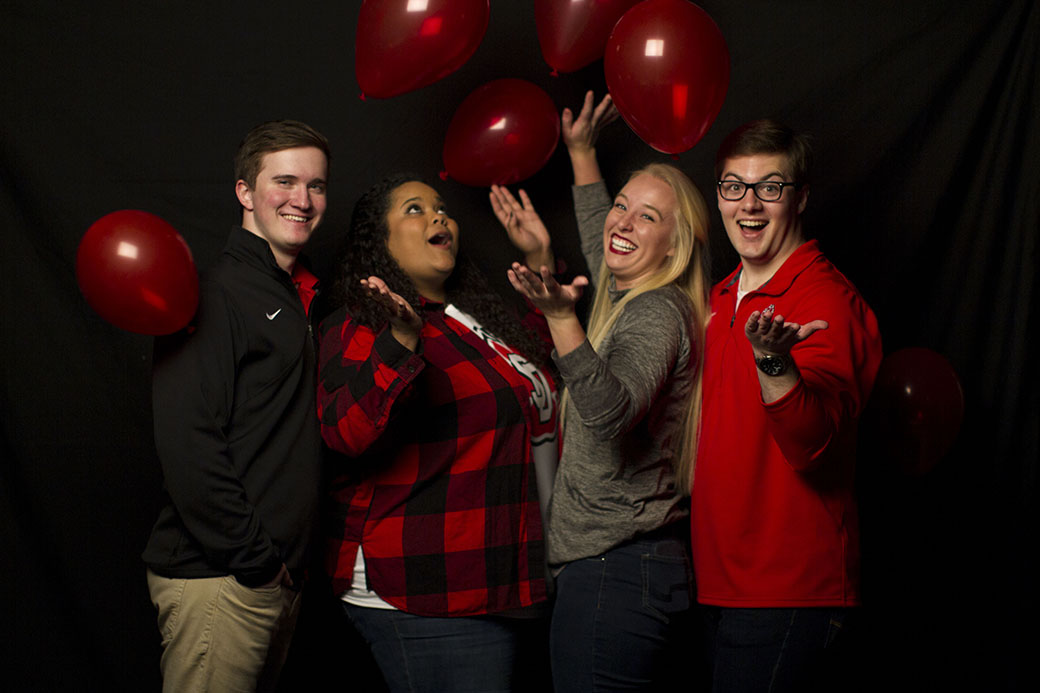
SGA executive team nominees talk platforms, campus involvement
Two teams, one goal. Junior Sadie Swier and sophomore Lucas Lund are running against junior Teagan McNary and sophomore Josh Anderson for the Student Government Association’s executive offices.
Teagan McNary, a presidential candidate, is a Vermillion native and is double-majoring in political science and criminal justice. She’s been involved in the criminal justice club, political science league and college democrats. She served as chair of the internal review committee in SGA and was in the student federation.
Josh Anderson, McNary’s running mate, is from Aberdeen and is double-majoring in political science and business administration. He’s a resident assistant in North Complex, a member of the Tau Kappa Epsilon fraternity, the inter-fraternity council, student ambassadors and a sorority and fraternity life ambassador.
McNary/Anderson Campaign from The Volante on Vimeo.
Sadie Swier, who’s running for SGA president, is from Hartford, S.D. and is majoring in communication studies. She’s the president of Lambda Pi Eta, the communication studies national honor society, and is involved in career ambassadors and strollers.
Lucas Lund, Swier’s vice presidential candidate, is from Sioux Falls and is double-majoring in Spanish and international studies. Lund is a member of Lambda Chi Alpha fraternity and is involved in the student alumni association. He joined SGA last spring and is part of the inter-fraternity council, Sigma Delta Pi, a professional business fraternity, and the Dakota Days committee.
Swier/Lund Campaign from The Volante on Vimeo.
The platforms
The Swier-Lund campaign aims to get SGA “back to basics” – the first point of their platform is to simplify the governing body.
“Our vision is to keep SGA simple,” Swier said. “We want to give student orgs and other students concise and exact and necessary information considering any kind of knowledge or issues that deal with campus or SGA.”
Swier and Lund will introduce more platform points as the election approaches, and Lund hopes this slow approach will help students digest their campaign better.
“I think what is great about what our campaign team is doing is kind of unveiling each part of it more slowly so we can have time for each section to sink in a little bit more and we can elaborate as we go,” Lund said.
While Swier thinks SGA is doing a lot of things well, she said communication with students could definitely be improved.
“This year (SGA) has been passing a lot of legislation, which is great, but as we’ve discussed before, we would really like to see more students aware of what exactly is being passed and what other resources that SGA can provide to students,” she said.
McNary and Anderson bring more than a combined four years served in SGA to the table. They’re taking a “three pillars” approach with their platform: involvement, improvement and inclusiveness.
The involvement pillar encourages students to be more involved with campus events. They hope to educate students about all the resources USD has to offer. The team also wants to improve lines of communication between SGA and students.
“USD has a lot of really great things to offer, the only problem is a lot of people don’t know that,” McNary said. “One thing we’re really pushing is resource utilization. It’s always great to bring new things to campus, but I think it’s really important to highlight and make sure that everyone is aware of all the great things we have on campus.”
Their second pillar is aimed at building partnerships between student and community organizations. They also hope to start an SGA community service project.
“We do a lot of things to push students into the community, but we don’t do a lot to bring the community here on campus,” Anderson said. “Whether it’s bringing community leaders here on campus to do a meet and greet, bring businesses, bring restaurants, to get students engaged with them.”
Their inclusiveness pillar is focused on reaching out to all students and partnering with the Center of Diversity and Community to educate students on how to foster an inclusive environment.
“USD does a really great job of striving for inclusive excellence and we just want to build off of that,” McNary said. “And we think the best way to do that is through education. Some different ways that we talked about is partnering with the CDC and working with their different organizations. I think the best way to learn about other cultures is to experience it.”
Hot topics
All candidates feel students should’ve been more involved with the recent GAF allocation.
McNary said she wanted to see the GAF increase decided by the students in a vote.
“I was a senator when it went to a student vote the first time two years ago and it passed,” McNary said. “However, I think it’s important that we include the new students here. It’s affecting two new classes that weren’t here to take part in that vote.”
Anderson thinks SGA should’ve done a better job educating students about the GAF increase.
“We need to make sure they understand how to request GAF money, how to get in on the allocation process,” he said. “We’ve had organizations come and say that they weren’t aware of how the GAF process works and how to get money allocated for them.”
Swier and Lund share a similar view.
“I do feel that the process of the GAF could have been communicated and elaborated more clearly before it became such an urgent issue,” Lund said.
Swier echoed Lund’s concerns about how SGA handled the allocation.
“We’re hoping that we can get people to understand what is going on, before frustration and situations like this happen in the future,” Swier said.



